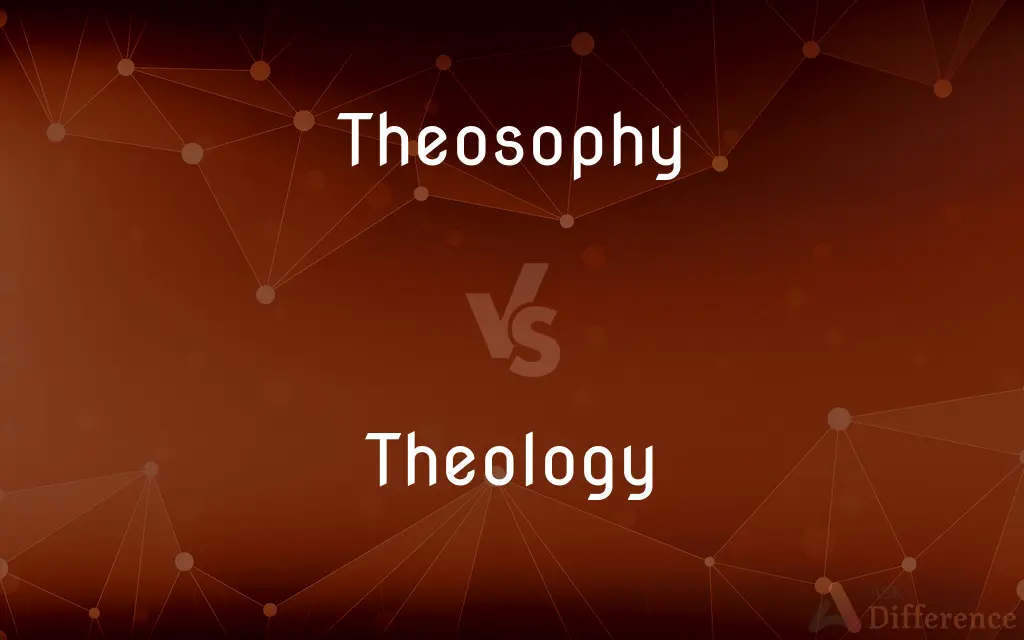Theosophy vs. Theology — What's the Difference?
By Fiza Rafique & Urooj Arif — Updated on March 31, 2024
Theosophy explores mystical insights into the divine or spiritual realms, while theology rigorously analyzes religious beliefs and the nature of divinity.

Difference Between Theosophy and Theology
Table of Contents
ADVERTISEMENT
Key Differences
Theosophy is deeply rooted in a mystical approach to understanding spiritual truths and the inner workings of the universe, often emphasizing personal spiritual experience. It draws from various religious traditions and esoteric philosophies, aiming to uncover the underlying unity of all. Theology, on the other hand, is an academic discipline that examines the nature of the divine, religious beliefs, and the practice of faith. It relies heavily on scripture, reason, and tradition as sources of authority. Theologians seek to understand and explain the concepts of God, creation, salvation, and the afterlife, among others, within a particular religious framework.
While Theosophy emphasizes personal spiritual development and the mystical experience of the divine, theology is more concerned with the intellectual and systematic exploration of religious beliefs. Theosophy seeks universal truths across different spiritual traditions, whereas theology tends to focus within the confines of specific religious dogmas and doctrines.
Both Theosophy and theology offer paths to understanding spiritual matters, but they differ significantly in their approaches and methodologies. Theosophy’s emphasis on mystical experience and the synthesis of various spiritual traditions contrasts with theology’s analytical and often doctrinal exploration of faith within a specific religious context.
Despite their differences, both fields can complement each other. Theosophy can offer broader, more inclusive perspectives on spirituality that might enrich theological studies, while theology provides a structured framework for exploring complex religious concepts, potentially grounding theosophical insights in historical and scriptural contexts.
Comparison Chart
Focus
Mystical insights and spiritual experiences
Systematic study of religious beliefs and divinity
ADVERTISEMENT
Methodology
Emphasizes personal enlightenment and universal truths
Relies on scripture, reason, and tradition
Traditions
Draws from various religious and esoteric traditions
Focused on specific religious frameworks
Goal
Personal spiritual development and enlightenment
Understanding and explaining religious concepts
Key Practices
Meditation, study of spiritual texts across cultures
Critical analysis and interpretation of scripture
Compare with Definitions
Theosophy
A mystical philosophy aiming at the direct understanding of divine truths.
Helena Blavatsky's works are foundational to modern Theosophy.
Theology
The systematic study of the nature of the divine and religious belief.
He pursued a degree in theology to deepen his understanding of Christian doctrines.
Theosophy
An esoteric tradition emphasizing spiritual development and the unity of all religions.
Theosophy considers the similarities between Eastern and Western spiritual practices.
Theology
The application of philosophical methods to religious concepts and practices.
Theology seeks to reconcile faith with rational thought through debate and interpretation.
Theosophy
The study and practice of mystical and occult wisdom to achieve spiritual enlightenment.
Theosophical societies offer courses on meditation and spiritual awakening.
Theology
An academic discipline that explores questions about God, creation, and ethics within a religious tradition.
Theological studies often include the analysis of biblical texts.
Theosophy
A belief system that combines elements of religion, philosophy, and metaphysics.
Theosophy blends teachings from Buddhism, Christianity, and Hinduism.
Theology
The critical study of the existence and nature of the divine, often focused within a particular religious framework.
His theology thesis explored the concept of redemption in early Christianity.
Theosophy
A path to understanding the mysteries of life and the universe through inner spiritual exploration.
Theosophists often engage in deep meditative practices to connect with the divine.
Theology
A branch of study that deals with the principles of religious faith, ritual, and the interpretation of sacred texts.
Theology students learn to interpret the Quran, the Bible, and other sacred texts.
Theosophy
Any of a number of philosophies maintaining that a knowledge of God may be achieved through spiritual ecstasy, direct intuition, or special individual relations, especially the movement founded in 1875 as the Theosophical Society by Helena Blavatsky and Henry Steel Olcott (1832–1907).
Theology
Theology is the systematic study of the nature of the divine and, more broadly, of religious belief. It is taught as an academic discipline, typically in universities and seminaries.
Theosophy
Religious philosophy or speculation about the nature of the soul based on mystical insight into the nature of God.
Theology
The study of the nature of God and religious truth; rational inquiry into religious questions.
Theosophy
Often Theosophy The system of beliefs and teachings of the Theosophical Society, founded in New York City in 1875, incorporating aspects of Buddhism and Brahmanism, especially the belief in reincarnation and spiritual evolution.
Theology
A system or school of opinions concerning God and religious questions
Protestant theology.
Jewish theology.
Theosophy
Any doctrine of religious philosophy and mysticism claiming that knowledge of God can be attained through mystical insight and spiritual ecstasy, and that direct communication with the transcendent world is possible.
Theology
A course of specialized religious study usually at a college or seminary.
Theosophy
(religion) Any system which claims to attain communication with God and superior spirits by physical processes.
Theology
(uncountable) The study of God, a god, or gods; and of the truthfulness of religion in general.
Theosophy
The system of beliefs and doctrines of the Theosophical Society.
Theology
(uncountable) religious studies
Theosophy
Any system of philosophy or mysticism which proposes to attain intercourse with God and superior spirits, and consequent superhuman knowledge, by physical processes, as by the theurgic operations of some ancient Platonists, or by the chemical processes of the German fire philosophers; also, a direct, as distinguished from a revealed, knowledge of God, supposed to be attained by extraordinary illumination; especially, a direct insight into the processes of the divine mind, and the interior relations of the divine nature.
Theology
(countable) An organized method of interpreting spiritual works and beliefs into practical form.
Theosophy
Belief based on mystical insight into the nature of God and the soul
Theology
(countable) A particular belief within a religion.
Theology
Subjective marginal details.
Theology
The science of God or of religion; the science which treats of the existence, character, and attributes of God, his laws and government, the doctrines we are to believe, and the duties we are to practice; divinity; (as more commonly understood) "the knowledge derivable from the Scriptures, the systematic exhibition of revealed truth, the science of Christian faith and life."
Many speak of theology as a science of religion [instead of "science of God"] because they disbelieve that there is any knowledge of God to be attained.
Theology is ordered knowledge; representing in the region of the intellect what religion represents in the heart and life of man.
Theology
The rational and systematic study of religion and its influences and of the nature of religious truth
Theology
A particular system or school of religious beliefs and teachings;
Jewish theology
Roman Catholic theology
Theology
The learned profession acquired by specialized courses in religion (usually taught at a college or seminary);
He studied theology at Oxford
Common Curiosities
Do you need to be religious to study Theosophy or Theology?
No, both fields can be studied from academic or personal interest perspectives without adhering to specific religious beliefs.
Is meditation a part of Theology as it is in Theosophy?
Meditation is more central to Theosophy as a tool for personal spiritual development, while theology might not emphasize meditation but rather prayer and study within its practices.
What is the main difference between Theosophy and Theology?
Theosophy focuses on mystical experiences and universal spiritual truths, while theology is the systematic study of religious beliefs and the nature of the divine.
Can Theosophy and Theology complement each other?
Yes, Theosophy can offer broader spiritual perspectives that enrich theological studies, and theology can provide a structured framework for exploring spiritual concepts.
How do Theosophy and Theology approach spiritual texts?
Theosophy draws insights from a wide range of spiritual texts across cultures, seeking universal truths, whereas theology critically analyzes and interprets texts within a specific religious tradition.
Can Theosophy be practiced outside of any religious context?
Yes, Theosophy can be approached as a spiritual philosophy independent of organized religion, emphasizing personal spiritual growth.
How do Theosophy and Theology contribute to understanding human existence?
They offer frameworks for exploring spiritual and ethical questions about life, existence, and the universe, though from different perspectives.
How do Theosophy and Theology address the afterlife?
Theosophy may incorporate beliefs in reincarnation and spiritual evolution, whereas theology’s views on the afterlife are defined by religious doctrine.
Do Theosophy and Theology require a belief in the supernatural?
Theosophy often entails a belief in mystical or spiritual realities beyond the physical, while theology may or may not require belief in the supernatural, depending on the religious context.
Is there a conflict between Theosophy and traditional religious beliefs?
There can be tensions, as Theosophy's inclusive approach to spirituality may challenge exclusive religious doctrines; however, many find them complementary.
Can a theologian be a theosophist, and vice versa?
Yes, individuals can explore both perspectives, integrating theological study with theosophical practices for a more comprehensive understanding of spirituality.
Are Theosophy and Theology considered sciences?
Both are considered branches of the humanities, focusing on spiritual, religious, and philosophical questions rather than empirical scientific inquiry.
How do Theosophy and Theology view the concept of God?
Theosophy often views God as an all-encompassing, divine presence within the universe, accessible through mystical experience, while theology defines God more specifically according to religious doctrines.
What is the role of ethics in Theosophy and Theology?
Both consider ethics important, though their approaches may differ; Theosophy emphasizes universal moral principles, while theology often focuses on ethical guidelines within specific religious traditions.
Share Your Discovery

Previous Comparison
Hexanol vs. Hexane
Next Comparison
Class vs. CohortAuthor Spotlight
Written by
Fiza RafiqueFiza Rafique is a skilled content writer at AskDifference.com, where she meticulously refines and enhances written pieces. Drawing from her vast editorial expertise, Fiza ensures clarity, accuracy, and precision in every article. Passionate about language, she continually seeks to elevate the quality of content for readers worldwide.
Co-written by
Urooj ArifUrooj is a skilled content writer at Ask Difference, known for her exceptional ability to simplify complex topics into engaging and informative content. With a passion for research and a flair for clear, concise writing, she consistently delivers articles that resonate with our diverse audience.














































